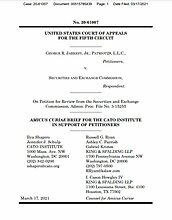Prior to 2010, the Securities and Exchange Commission could use its in‐house courts to pursue punitive sanctions against only registered market participants. With the passage of the 2010 Dodd‐Frank Act, however, Congress authorized the SEC to seek penalties against “any person” through its home‐court proceedings, where the agency acts as both prosecutor and judge.
George Jarkesy was among the first targets of this enhanced authority.
In early 2007, Mr. Jarkesy undertook the management of several investment funds. Those funds were geared toward sophisticated parties interested in high‐risk, high‐reward investments. Unfortunately, the funds suffered losses during the 2008 market collapse. Despite the absence of any investor complaints, the SEC launched an investigation into Mr. Jarkesy’s management of the funds. In 2013, the SEC alleged that he had violated federal securities law. Exercising its new Dodd‐Frank authority, the SEC elected to prosecute its case through the agency’s in‐house court system.
Mr. Jarkesy’s hedge‐fund businesses did not fall under the licensing authority of the SEC, and he did not need the agency’s permission to open or manage his hedge funds. Before the 2010 Dodd‐Frank Act, he would’ve gotten his day in court, before a jury of his peers. Instead, he was subjected to a Kafkaesque administrative adjudication that lasted more than seven years. Predictably, the SEC ruled against Mr. Jarkesy and imposed a lifetime ban on employment in the securities industry, in addition to a $350,000 fine.
Now, Mr. Jarkesy is challenging the SEC’s ruling in the Fifth Circuit. He argues that the SEC’s in‐house proceedings violated his due process guarantees and also his Seventh Amendment right to a trial by jury. Today, the Cato Institute filed a brief in support of Mr. Jarkesy. Our brief argues that the SEC’s home court advantage in these adjudications is not consistent with our constitutional order, and it yields predictably biased and unfair results.




